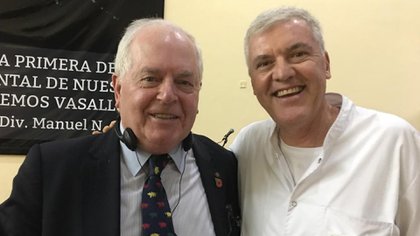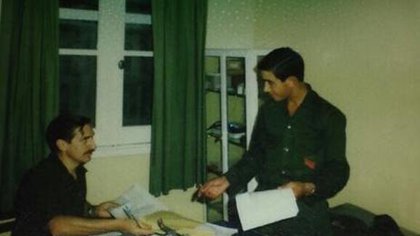@WarDiaryF82
Medicine in times of war
Today medical general (retired) Juan Carlos Adjigogovic was stationed in the 12th Infantry Regiment, based in Mercedes, Corrientes, when the war began.
#Malvinas #Medicos #EjercitoArgentino #Gesta #CausaNacional
Medicine in times of war
Today medical general (retired) Juan Carlos Adjigogovic was stationed in the 12th Infantry Regiment, based in Mercedes, Corrientes, when the war began.
#Malvinas #Medicos #EjercitoArgentino #Gesta #CausaNacional
He was transferred with the unit to assist his comrades in the positions they occupied in Goose Green and Darwin. He says that in the "health facilities that he shared with the Air Force, military personnel were treated for their injuries and illnesses. In addition,
weight loss was monitored and instructed on trench foot prevention. The health problems of the local population were also addressed. ”
"In the final combat, we were able to attend to our wounded and many were assisted by the British health service," he describes, while
"In the final combat, we were able to attend to our wounded and many were assisted by the British health service," he describes, while
acknowledging that he was not mistaken in choosing the Army to carry out his professional activity.
Along those lines, medical colonel Alejandro Steverlynck also expresses himself, who after attending to the wounded from the attack on May 1, attending to the Malvinas civil
Along those lines, medical colonel Alejandro Steverlynck also expresses himself, who after attending to the wounded from the attack on May 1, attending to the Malvinas civil
hospital and evacuating by helicopter, voluntarily went to the front line, accompanying a party of the 4th Infantry Regiment on Mount Two Sisters. "My job is to heal and help the good dying," he explains, remembering that he had to work under permanent bombardment. “All our
movements at night were complicated. The mountain was humid and full of stones, so when you went down, you hit more than one blow ”, he says.
“When the combat arrives, as a doctor, it's time to pick up the wounded and take them to a relief station. There you become someone who,
“When the combat arrives, as a doctor, it's time to pick up the wounded and take them to a relief station. There you become someone who,
when unfortunately the patient is beyond, helps him to die well, "he explains, adding that there was an instant that he can never leave out. “A soldier had got a splinter in his liver. Covered in blood, his face was one of pain and horror. I remember that I went over there, put
a compress on it, gave him morphine and told him that I was going to be able to see the World Cup, very warm. I was a few minutes, his face was gone with pain. He died with a smile, I will never forget his face, "he reflects.
After those episodes, prisoners fell. Alejandro
After those episodes, prisoners fell. Alejandro
describes the pain of defeat: "I had a wounded man and I remember that when we surrendered, he told me he wanted to continue." For Steverlynck, the fighters "were made men and rights." He witnessed their cries as they dropped the rifle after the surrender. “I saw our soldiers,
NCOs and officers die on the front line. Over time, I understood that it was a worthy defeat. We did more than the British expected. "
Steverlynck also mentions a lesson an English officer gave him. When prisoners fell, a royal marine asked him if they could make a response for
Steverlynck also mentions a lesson an English officer gave him. When prisoners fell, a royal marine asked him if they could make a response for
the fallen of all: “I was crying and he hugged me. He clapped me and said: ‘Good job. It cost us a lot. ’ I replied that the dead who were there had been made by them.
And he replied, in Spanish: ‘When the fight is over, the professional does not hate. If we see ourselves in another war, respect us as I respect you. "
“I don't like to talk about myself, because I came back. Many people stayed there, others returned and suffered.
“I don't like to talk about myself, because I came back. Many people stayed there, others returned and suffered.
The experience helped me a lot on a human level. I have been in the Army for 40 years and the patience of my comrades was immeasurable. It fills me with pride to be a military doctor ”, he closes.
Dr. Alejandro Steverlynck along with British military doctor James Ryan during a course in Argentina.

 Read on Twitter
Read on Twitter



